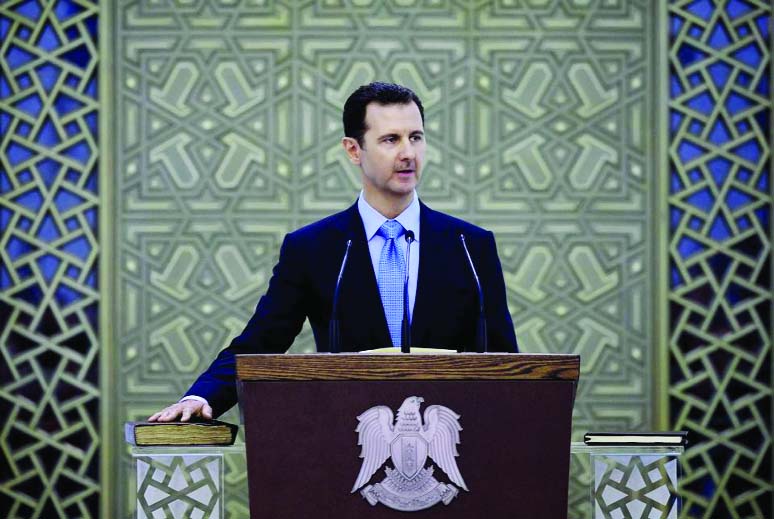
AFP, Paris :
Syria’s conflict will be long and difficult and its army cannot be everywhere at once, President Bashar al-Assad said in an interview published by a French magazine today, in which he also vowed to remain in power.
Assad told Paris Match no one could predict when the war with insurgents seeking to oust him would end but said enemies had failed to win over the population, allowing the military to advance.
In extracts published on Wednesday, Assad also said US-led air strikes in Syria since September were an “illegal intervention” that had made no difference in the fight against Islamic State militants who are fighting government forces.
“The Syrian army cannot be everywhere at once. Where it is not present, terrorists take the opportunity to cross borders and infiltrate in one area or another,” said in the French language magazine in comments translated by Reuters.
“It is not about a war between two armies, where one occupies a territory and the other another one. It is another type of war. We are dealing with terrorist groups that infiltrate a town or village. So this war will be long and difficult.”
The text was also carried by Syrian state media today.
Meanwhile, the destruction of 12 chemical weapons facilities in Syria is expected to start later this month, and the work should be complete by the end of June 2015, U.N. diplomats said Wednesday.
U.N. Security Council diplomats who were briefed Wednesday on international efforts to eliminate the chemical weapons program still expressed worries that Syria hasn’t made a full declaration of its chemical weapons capabilities.
“There are still some issues that need to be resolved in that declaration,” British Ambassador Mark Lyall Grant said, without giving details. In October, council diplomats were startled to be told in a briefing that Syria had declared four chemical weapons facilities it hadn’t mentioned before.
Syria’s U.N. ambassador, Bashar Ja’afari told reporters, “There is no anymore any Syria chemical program.”
The U.N.’s mandate in a joint mission with the Organization for the Prohibition of Chemical Weapons has ended, but some diplomats want direct reports to the council to continue.
The OPCW, the global chemical weapons watchdog based in The Hague, Netherlands, is overseeing the entire mission, including the planned destruction, but Lyall Grant called for “close monitoring” by the council. Ja’afari appeared to reject that idea, saying any outstanding issues are “purely technical.”
Syria’s conflict will be long and difficult and its army cannot be everywhere at once, President Bashar al-Assad said in an interview published by a French magazine today, in which he also vowed to remain in power.
Assad told Paris Match no one could predict when the war with insurgents seeking to oust him would end but said enemies had failed to win over the population, allowing the military to advance.
In extracts published on Wednesday, Assad also said US-led air strikes in Syria since September were an “illegal intervention” that had made no difference in the fight against Islamic State militants who are fighting government forces.
“The Syrian army cannot be everywhere at once. Where it is not present, terrorists take the opportunity to cross borders and infiltrate in one area or another,” said in the French language magazine in comments translated by Reuters.
“It is not about a war between two armies, where one occupies a territory and the other another one. It is another type of war. We are dealing with terrorist groups that infiltrate a town or village. So this war will be long and difficult.”
The text was also carried by Syrian state media today.
Meanwhile, the destruction of 12 chemical weapons facilities in Syria is expected to start later this month, and the work should be complete by the end of June 2015, U.N. diplomats said Wednesday.
U.N. Security Council diplomats who were briefed Wednesday on international efforts to eliminate the chemical weapons program still expressed worries that Syria hasn’t made a full declaration of its chemical weapons capabilities.
“There are still some issues that need to be resolved in that declaration,” British Ambassador Mark Lyall Grant said, without giving details. In October, council diplomats were startled to be told in a briefing that Syria had declared four chemical weapons facilities it hadn’t mentioned before.
Syria’s U.N. ambassador, Bashar Ja’afari told reporters, “There is no anymore any Syria chemical program.”
The U.N.’s mandate in a joint mission with the Organization for the Prohibition of Chemical Weapons has ended, but some diplomats want direct reports to the council to continue.
The OPCW, the global chemical weapons watchdog based in The Hague, Netherlands, is overseeing the entire mission, including the planned destruction, but Lyall Grant called for “close monitoring” by the council. Ja’afari appeared to reject that idea, saying any outstanding issues are “purely technical.”

